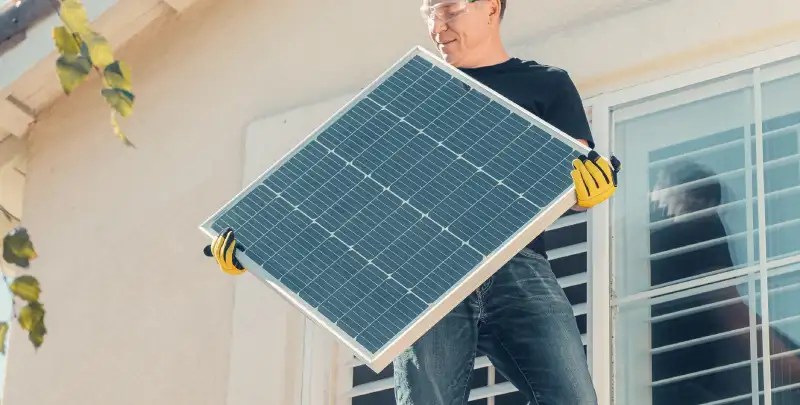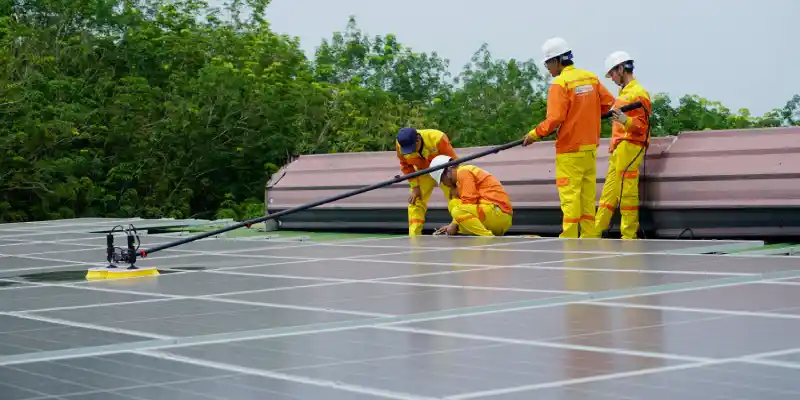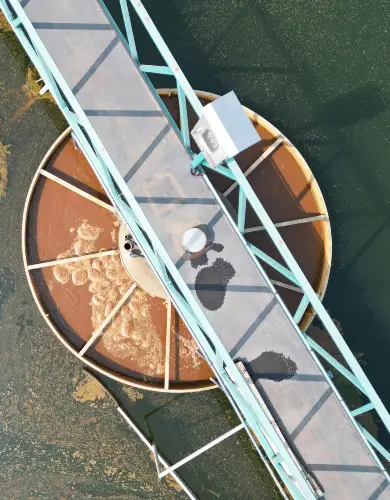Assessing the suitability of solar panels for your business
As energy costs rise and sustainability becomes a business priority, many organisations are exploring commercial solar panels as a long-term solution.
This guide outlines the key factors to consider when assessing whether solar power is a suitable and cost-effective option for your business.
Why should your business install solar panels?
There are many reasons for your business to install its own solar photovoltaic (electricity) or thermal (heating water) system. Here are 6 of them:
| Energy independence: | Reduce or eliminate reliance on grid energy and its expensive business electricity rates |
| Reduce energy bills: | Save costs in the long run by reducing or outright eliminating energy bills |
| Environmental credentials: | Become a verifiably greener business committed to reducing its carbon footprint |
| Property value: | Increase the value of your business property as any solar system is an infrastructure asset. |
| Indirect benefits: | Attract and retain young talent, supercharge your green PR potential. |
| Diversify your business venture: | Cheap excess electricity can be used to mine cryptocurrencies, start an agrivoltaics venture, etc! |
While it’s hard to argue against these, solar energy is not ideal in all scenarios.
It requires the willingness and access to capital to make the large capital investment needed for a commercial solar installation. Property ownership within a ‘permitted’ area also makes it suitable.
💡 Our team believes that installing solar power is a no-brainer in most cases. With some creativity, it will always be ultimately beneficial to any business, even if it comes in the form of a Corporate PPA.
We look at this in more detail in the following section.
What factors decide the suitability of solar panels?

Your business’s finances, property and energy habits are the three biggest factors that determine the suitability of installing any solar system, be it panels alone, thermal solar, or a complete panel and battery solution. All the factors below stem from these three:
Return on Investment (ROI)
For most businesses, it all comes down to money. Solar system installations are akin to installing your own power generator. A solar installation requires an initial investment and ongoing maintenance costs but will eventually pay for itself through reduced energy bills and a new revenue stream from exporting the excess electricity back to the grid.
While the ROI is not a factor in itself, it is the measurement tool that lets you decide if there is a business case for it.
💡 See our comprehensive guide on commercial solar panel costs if you think you’ve missed something on your ROI calculation: There’s certainly a lot more than what meets the eye!
Planning permission and regulations
Solar panel installations in the UK are ‘permitted developments’, meaning that in most cases, no planning permission from the local authority is required as long as the installation fulfils some basic criteria.
One of these criteria is that your business property is not within an area or is not of special status. This includes areas of conservation, historical or archaeological importance, natural beauty, scheduled monuments, etc.
Being in one of these areas is not prohibitive but adds another layer of complexity to a solar panel installation. The approval of your installation is then at the mercy and discretion of the local authority.
Other criteria include array sizing, positioning within the roof, walls or ground, and other nuanced rules that somewhat differ in each home country. For instance, in Wales and Scotland, commercial solar panels are not permitted within a certain distance of airports.
This means that any niche installation outside these tight rules (say floating solar panels on your small reservoir) or installing regular panels on a roof that faces the highway), you’re almost certainly going to need planning permission for it.
💡 Read our detailed guide to learn more about commercial solar and the regulations your business is bound by depending on where you are and what you plan to install.
Installation complexity
Most properties will fit in a standard, roof-mounted solar system on their roof that meets all permitted development standards. However, some others will need a more expensive tailor-made solution.
For example, historical buildings or buildings with unorthodox roof shapes may find solar roof tiles as the only viable option, given their aesthetics and adaptability.
Regardless, any installation that diverges from a standard one will generally cost more, take longer, and may require permission. This could be a decisive factor for many businesses.
💡 On the bright side, there’s a niche solar technology to satisfy any special requirement. From portable solar systems for construction crews to modular thermal solar, find more in our article on niche solar technologies.
Solar service availability
In most parts of the UK, numerous solar installation and maintenance companies can provide the appropriate professional servicing for your photovoltaic or solar thermal installations.
However, this is not true in remote areas like some parts of rural Scotland and Wales. Professional service staff may need to travel a long way and perhaps even need lodging and food, incurring much higher costs than a local company.
In a way, opting for a low-maintenance solar installation is advantageous, but doing so may depend on your business’s current energy situation. Recall that virtually all other energy technologies require more frequent attention.
Energy habits
Your business’s energy consumption patterns significantly affect the impact of a solar system. All businesses require energy, but if your consumption is predominantly at night, seasonal, or if energy costs are only a minor part of your expenses, then the decision to install solar panels becomes nuanced.
Here are two examples:
A seasonal, seaside ice cream shop
For a small business like an ice cream shop operating only from April to November, investing in solar panels to reduce energy bills might not be practical. Storing energy during the off-season for use in the on-season isn’t feasible.
While selling excess electricity back to the grid during the off-season is an option, they require system monitoring, which can be a hassle.
Most seasonal businesses prefer closing down during the off-season or opting for a business energy tariff with no business energy standing charge, if available.
💡We’ve produced a specific guide for small business energy to provide advice to micro-businesses like ice cream shops.
An energy-intensive tech centre
For a business like a tech company, where energy consumption makes business electricity prices a significant overhead– especially if running servers 24/7 – investing in solar panels, particularly with solar batteries, becomes much more appealing.
Not only can this business hedge against the price volatility of grid electricity, but it can do so while implementing a long-term solution. Once the initial capital expenditure is recouped, it’s all extremely cheap electricity and a property with a higher valuation.
💡 We’ve produced a guide for large business energy to provide advice to energy-intensive sectors. Our commercial energy experts can help these organisations compare business energy prices.
Revenue streams from solar power
Businesses can earn revenue from excess solar power in multiple ways. Hands-on businesses, in particular, can leverage government incentives and mechanisms to generate significant profits through electricity arbitrage strategies.
Here are some of the mechanisms available to make a solar panel system more financially viable:
- Smart Export Guarantee: Businesses with MCS-certified micro-generation systems like solar panels can utilize the Smart Export Guarantee. This scheme allows electricity suppliers to purchase any surplus electricity their business produces. Business energy suppliers such as Octopus offer many attractive variable export tariffs. Remember that you need approval from your local DSN and MCS-certification installers to ensure compliance.
- Utilising excess electricity: Depending on your business’s expertise, there are creative ways to use excess solar power. For instance, some businesses have heated greenhouses to boost their yields.
ESG and corporate image
For businesses, particularly larger ones that are publicly traded or aim to be, meeting specific environmental standards is often a prerequisite for trading and accessing specific types of benefits and credits.
Environmental, Social, and Governance (ESG) criteria are increasingly influential in these corporate decisions. Installing solar systems to ensure that energy needs are met sustainably with green, renewable energy for business is becoming a more attractive option.
💡 This trend is supported by the decreasing cost of solar systems and their improved integration with the broader electricity grid.
Small businesses also need to consider the public relations aspect. Demonstrating that they generate electricity from renewable sources can significantly enhance their image.
Combined with carbon credits, many businesses can achieve net-zero status, appealing to certain demographics and potentially boosting sales.
Expert consultation and assessment

While businesses are experts in their specific fields, they may not be adept at assessing the nuanced regulations or technical issues affecting solar panel installations on their properties.
Have you considered potential maintenance issues, such as dealing with many pigeons in your area or dust accumulation on your panels due to nearby fields? Additionally, have you factored in the potential need for a highly customisable inverter to optimize your output?
Consulting with local installers and other businesses that have embraced solar energy is an excellent way to identify aspects you might have overlooked in your solar suitability analysis.
Energy audits
Hiring a third party to do a business energy audit is also essential. It helps you understand your current energy habits, including how many panels, inverters and batteries you would need to reach your goals (be it reducing bills, going off-grid, etc), while identifying areas of inefficiency.
Often, addressing these inefficiencies before considering a solar installation can reshape your business case for investing in a solar system.
System requirements
Once you understand your energy habits (how much and when you consume energy), you’ll need to calculate what size and solar components you require in your installation.
While you can do a simple back-of-the-knapkin calculation for this, its best to bring a solar installer to physically come to your property to get you a quotation. While you may be able to do this over the phone, a live inspection is necessary to identify any additional challenges for your property. They will look at (among other things):
- Roof orientation or suitable uncovered ground-space
- Roof condition
- Vegetation
- Potential permitting issues
💡 Remember that the success of your solar system ultimately depends on the quality of your installers. Compare the best commercial solar panel installers available in your local area and find the best deal for your property.

